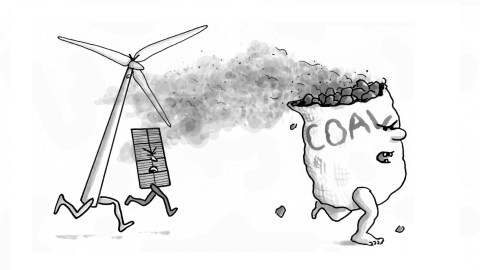Why do the good guys have to beat the climate cheats?

Illustration by Julia Suits, author of The Extraordinary Catalog of Peculiar Inventions, and The New Yorker cartoonist.
- Filthy-fuel suffering is here today: 95% of humans breathe “dangerously polluted air,” and globally “1 in 6 deaths are caused by air pollution.”
- Paying extra for cleaner energy buys reduced suffering for today’s kids and all future humans.
- For more “moral clarity” always look under “the numbers,” and put their abstract tacit tradeoffs in concrete and personal terms.
Like the kid in the emperor’s new clothes tale, Greta Thunberg sees through the “smart” games that blind us to clear, present, and colossal danger. These number-struck rituals of rationality were built for a world we no longer live in. Here’s how to get more “moral clarity” (and avoid sophisticated math-masked moral and mortal mistakes).
Too much climate-crisis thinking presumes we should only do what we know is “right” if that’s as cheap as today’s bad way. But why is that the correct criteria? Current pollution-cheat prices ignore that the status-quo system can’t last long. And that move voids vast avoidable suffering from “smart” considerations.
Here’s the concrete tradeoff logic lurking under “the numbers” and market abstractions:
a) Keep using cheap dirty energy and your kids will have worse and shorter lives.
b) Choose higher-and-truer-cost clean energy but your kids live better and longer lives.
What we get for paying extra is reduced suffering — for today’s kids, and for all future humans.
“How Dare You” not pay to prevent harming the life chances of the young, Thunberg thundered at the U.N. To keep using filthy fuel is to knowingly increase suffering (surely that “would be evil” declared Thunberg).
Again, using pollution-cheat prices as a barrier ensures ethical errors — moral mistakes that will make billions of lives worse.
Lest you think I’m exaggerating, consider this: “Over the last several decades, policy consensus has cautioned that the world would only tolerate responses to climate change if they were free—or [cheaper than current costs]” from David Wallace Welles’s must-read The Uninhabitable Earth. Let’s translate: Many of those trained in our governing games feel we should only stop burning the biosphere if it’s cheap enough to not hurt profits. Otherwise, burn on. And burden kids with the “planetary overdraft” they’ll have to pay dearly for.
Stopping climate change will pump trillions into the economy
Countless cases of similar hidden hideous “logic” exist (e.g. this capitalism-will-save-us piece brags that “solar and wind can now go head-to-head with fossil fuels“). Phrases like “commercially viable” often signal the same ethics error — basically no price in any current market covers actual full clean-up costs.
Status-quo market-thinking stokes this poisonous “planetary overdraft,” and most “cheapest option” thinking ignores that mitigation costs ruthlessly compound over time. Every delay increases ultimate costs. And don’t forget those “costs” translate to real people really suffering.
And filthy-fuel suffering isn’t only a future woe. It has deadly effects right now, we just aren’t paying attention. Ninety-five percent of humans breathe “dangerously polluted air,” and globally “1 in 6 deaths are caused by air pollution.” To not aggressively switch to cleaner, costlier energy risks a best-case death toll of “25 holocausts.” Our business-as-usual games will beat the old one-Holocaust “banal evil.”
The main old-moral-world case for using lowest-cost energy is to avoid reducing “growth.” But that growth-at-all-costs mindset ignores now-known material and moral limits. There is no known way to avoid selectively reducing material growth (today’s material burn rate is at 160% of what the Earth can sustain).
Like our physical infrastructure, much of our cognitive infrastructure must be retooled for those now-known material and moral limits we face. You may want to weigh with more care what you’re willing to pay to do the “right thing” (e.g., giving our kids better lives).
For more “moral clarity” always look under “the numbers,” and put their abstract tacit tradeoffs in concrete and personal terms. That’s the same move used in prior Thought Fix posts to reveal errors in typical “discounting” and “growth” arguments. Similar moves can reformulate many worked-in-the-old-world “smart” games.




